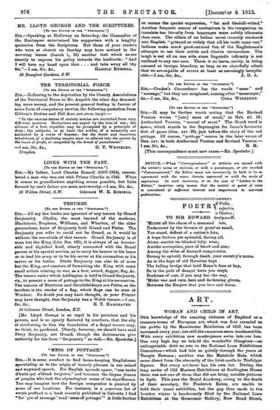TENURES.
[To THE EDITOR 01 THE " SPECTATOR:9 SIR,—All my law books are ignorant of any tenure by Grand Serjeantry. Challis, the most learned of the moderns, Blackstone, Stephens, Williams, and Wharton, of the older generations, know of Serjeanty both Grand and Petite. The Serjeanty you refer to could not be Grand, as it would be without the essentials of that tenure. Grand Serjeanty is of none but the King (Litt. Sec. 161), it is always of an honour- able and dignified kind, closely connected with the Royal person or his special service, as to carry his banner or his lance or to lead his army or to he his server at his coronation or his carver or his butler. Petite Serjeanty can also be of none but the King, and consists of furnishing the King with some small article relating to war, as a bow, sword, dagger, flag, Ste. The tenure under which Addington is held is Grand Serjeanty, viz., to present a mess of pottage to the King at his coronation. The tenures of Blenheim and Strathfieldsaye are Petite, as the incident is the render of a flag, which flags can be seen at Windsor. No doubt you may have thought, or your Printer may have thought, that Serjeauty was a Welsh tenure.—I am,
Sir, itc., E. T. HARGRAVES.
10 Coleman Street, London, B.C.
[Mr. Lloyd George is so royal in his promises and his powers, and is so openly flattered by courtiers, that the slip of attributing to him the foundation of a Royal tenure may, we think, be pardoned. Clearly, however, we should have said Petty Serjeanty, not Grand, though the dictionaries give authority for the form " Serjeantry" as well.—ED. Spectator.]


































































 Previous page
Previous page